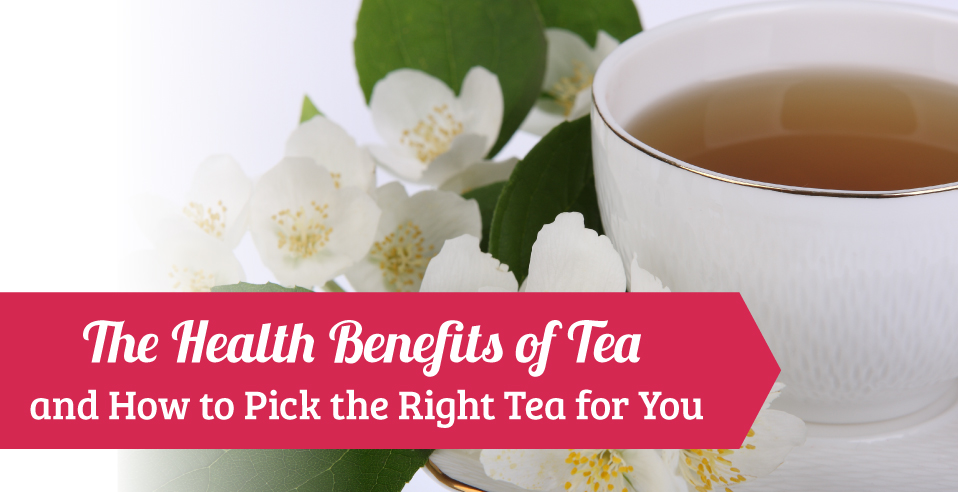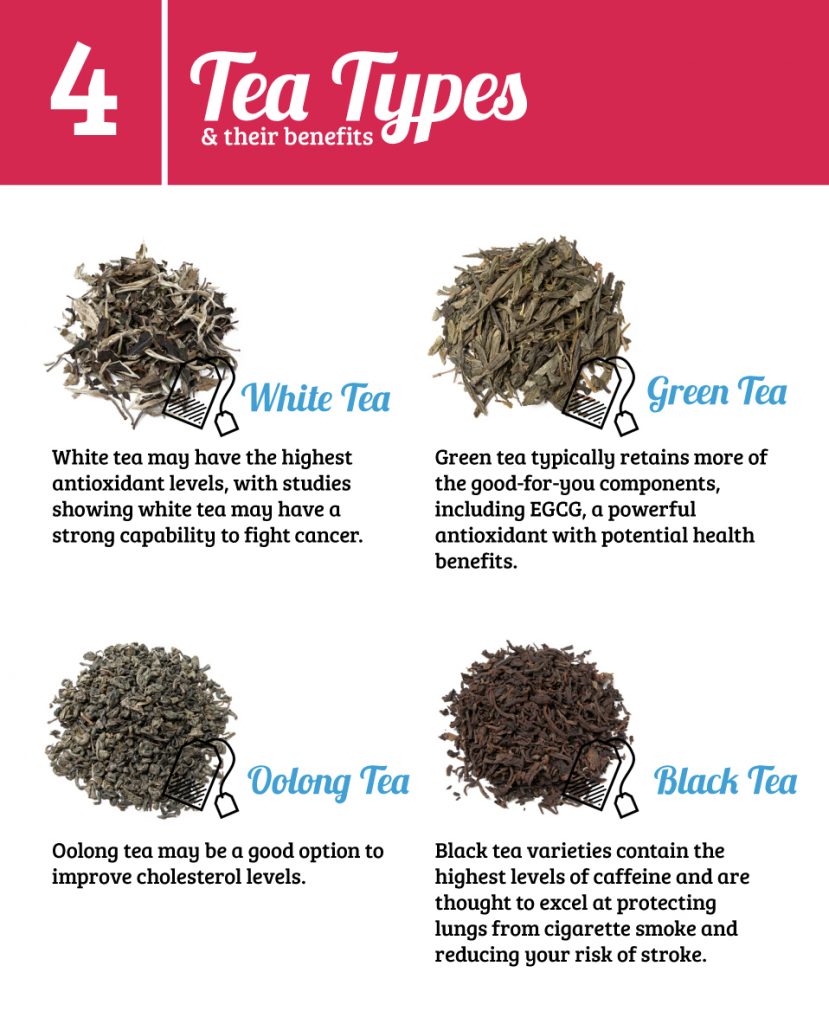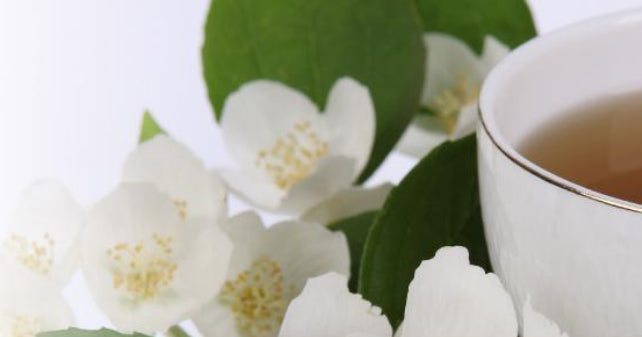
Is tea good for you? Many people wonder just what goes into a cup of tea and how it might affect the body. Tea isn’t a magic bullet, but many of the components of tea have been shown to offer specific health benefits. Combining daily tea with other healthy habits might help you feel better and potentially prevent health issues.
Keep in mind that many factors go into overall health, and your body may react differently than someone else’s. No matter what, though, when you brew a cup of tea, you may just serve yourself some pretty amazing benefits.
Types of Tea
All tea comes from the plant called Camellia sinensis, with the exception of herbal teas, which aren’t technically tea. There are four main types of tea: green, black, oolong and white. The processing time and processing techniques create the different types of tea. The processing can also affect the health benefits received from different tea varieties.

Here’s a rundown of the different types of teas:
- White tea: This type of tea is uncured and unfermented, making it the least processed of all tea types. The leaves of the plant are picked early before the bud opens and when small whitish hairs are still present. The leaves are sun dried. Because of the minimal processing, white tea may have the highest antioxidant levels, with studies showing white tea may have a strong capability to fight cancer. White tea is also the mildest type in terms of flavor.
- Green tea: Green tea is one of the least processed types of tea as well, coming in right after white tea. While the tea leaves go through some processing, it isn’t as substantial as other tea varieties. The Camellia sinensis leaves get steamed to create the green tea. Because it is one of the least processed, green tea typically retains more of the good-for-you components, including EGCG, a powerful antioxidant with potential health benefits. For this reason, many studies related to the health benefits of tea center around green tea.
- Oolong tea: Oolong tea goes through a fermentation or oxidation process, but the process is shorter than black tea. The leaves are fired at the end of the oxidation process so they don’t continue fermenting. Oolong tea may be a good option to improve cholesterol levels. It falls somewhere between green and black tea in the flavor department — not quite as strong as black tea but with a more intense flavor than green tea.
- Black tea: Black tea goes through the most processing, which includes fermenting the tea leaves. Fermentation causes the green leaves to turn the black color. Black tea varieties contain the highest levels of caffeine and are thought to excel at protecting lungs from cigarette smoke and reducing your risk of stroke.
Protection Against Health Problems
There are many ways teas can potentially protect you from health problems, and heart health is just one of the many areas. Studies show that drinking one to three cups of tea daily could reduce your risk of heart attack by 20 percent and your risk of stroke by 35 percent according to some studies. Drinking four or more cups per day could result in a 32 percent lower chance of having a heart attack.

Tea drinkers may have fewer calcium deposits in their arteries. Since those calcium deposits are linked to stroke, heart disease and other serious health problems, the decreased amount is a definite heart-healthy benefit. The higher consumption levels may also reduce your LDL cholesterol levels, which supports overall heart health.
A healthy heart is just the start of the health benefits. Drinking tea may help in other ways including:
- Reduced risk of Parkinson’s disease
- Prevention of neurological diseases, such as Alzheimer’s and other degenerative diseases
- Protection against many types of cancer, such as breast, colon, lung, skin, stomach, esophagus, liver, ovarian, oral and prostate
- Slowed progression of certain types of cancers
- Protection against UV rays to reduce the risk of disease and skin damage
- Reduction in pollen allergies
Drinking a cup of tea won’t magically prevent you from having health problems. Other risk factors, such as smoking, exercise, BMI, family history and your age, also play a strong role in the development of disease or health issues. Incorporate tea drinking as part of a healthier overall lifestyle for the greatest benefit.
The list of potential benefits of drinking tea still doesn’t stop there, however. Here are ten more:

1. Weight Loss Booster
Many people swear by tea as an aid in losing weight. Studies show mixed results on the weight loss benefits of tea, but some researchers believe the caffeine content in tea helps promote weight loss by burning fat more efficiently. Tea may also help boost the metabolic rate, which makes weight loss a little easier. Numerous studies show that people who routinely drink tea have lower BMIs than their non-tea-drinking counterparts.
Tea may also help control cortisol levels. Cortisol is a hormone linked to increased skin aging and belly fat. While tea isn’t a diet pill, it might help support the weight loss efforts you are already taking to help you get to a healthy weight.
2. Improved Body System Functioning
Tea may even help your immune cells do their job better. When those cells are at peak performance, they are better able to reach and attack all those invaders that try to make your body sick. Regular tea consumption could help you escape the yearly sicknesses that inevitably infect offices and schools.
While herbal teas aren’t technically teas since they don’t come from the Camellia sinensis plant, they may help soothe your digestive system to keep your tummy feeling better. Chamomile is an example of a tea that works well for the digestive system. It is antispasmodic, which may help people with irritable bowel syndrome. If you feel nauseous, sipping on ginger tea may help.
3. Stronger Bones
Bone strength is a concern for everyone, and tea may help ease those worries a bit. People who drink tea on a regular basis often have greater bone density than those who don’t. Some studies show the beverage may prevent bone loss, thanks to the flavonoids in tea. That means your daily cup of tea could help prevent osteoporosis, which becomes more of a concern the older you get.
4. Oral Health
Tea may help keep your teeth and mouth healthier. Many beverages erode the enamel on your teeth, causing them to break down and become more susceptible to cavities. Tea doesn’t seem to have that corrosive effect on tooth enamel. Tea may also change the pH level in your mouth, creating an environment that is less conducive to cavities.
Studies also show that tea has an antibacterial quality. What does that have to do with oral health? Bacteria often contribute to tooth decay, cavities and plaque buildup on the teeth, so eliminating that bacteria by drinking tea can help improve your oral health. Green tea may even help improve your breath.
5. Improved Endurance
Antioxidants called catechins found in green tea may improve your body’s ability to burn fat as a source of fuel. This can increase your muscle endurance, which is particularly beneficial during exercise. Sip on a cup of tea before your workout to keep those muscles moving for maximum exercise performance. Another cup of tea after your workout helps you hydrate.
6. Healthy Hydration
A cup of tea hydrates your body with a little more flavor than a glass of plain water. Staying hydrated helps your body function more efficiently and is particularly important when you are hot or after you exercise. When no sugar or other ingredients are added, tea is a zero-calorie drink, which keeps your daily calorie intake down. Tea also typically has about 50 percent less caffeine than coffee, so you can hydrate without the jitters. Drinking brewed iced tea offers a refreshing way to hydrate with tea.
7. Recovery From Medical Procedures
Sometimes you face health problems, no matter how well you take care of yourself. Tea may help you recover from procedures to treat those conditions. A study on radiation treatments showed that tea may help the body better weather those treatments by protecting against cellular degeneration that normally happens with radiation. Studies also show that tea may help the skin recover after radiation treatments.
People who have type 2 diabetes may be better able to process sugars with the help of green tea because it may improve insulin sensitivity. The drink may also help prevent type 2 diabetes in people who don’t yet have the disease. Tea won’t cure diabetes or other health conditions, but it may help your body handle those health issues a little easier.
8. Anti-Inflammatory Properties
Inflammation wrecks havoc on the body, with links to many different health problems, including arthritis, depression and metabolic syndrome. The compounds found in tea may decrease inflammation and inflammatory reactions in the body, potentially reducing your risk for health concerns. Reducing inflammation also prevents water retention and may make you look less puffy.
9. Better Focus
A cup of tea may be just what you need to focus on your daily to-do list. While the caffeine content is lower than coffee, tea does have some caffeine, which pairs with theanine for a boost in mental alertness in the brain. Tea may help you work more accurately and better handle switches from one task to another. Some studies show improvements in memory and attention span, which could help your mental sharpness as you age.
10. Antioxidant Power
Tea contains antioxidants, which are known to combat free radicals in the body. While the body does fight free radicals on its own, it doesn’t hurt to lend a helping hand with antioxidant-rich substances. Getting rid of free radicals helps reduce cell and molecule damage to prevent diseases and slow aging. Who doesn’t want to stay healthier and look great doing it?
Keeping Your Tea Healthy and Safe
Tea is a healthy beverage, but the way you prepare your cup of tea can impact its overall quality and health. Using a ceramic stovetop teapot and or tea-kettle prevents any heavy metals, toxins and other chemical and toxins from getting into your tea. This allows you to enjoy the flavor and health benefits of tea without unexpected additives.

Maximize the benefits of drinking tea with these preparation tips:
- Use ceramic: When it comes to both the tea kettle and teapot and the teacups you use, choosing ceramic is a safe option. Our eco-friendly ceramic kettles and mugs offer a green option for brewing your tea without metals and chemicals that can leach into the water. Using ceramic also eliminates the metal taste you usually get when using a metal tea kettle, allowing the full flavors of the tea to be revealed.
- Use a healthy infuser: If you prefer to brew with loose leaf teas, you need a healthy infuser. We offer silicone tea infusers that offer a healthy nonmetallic way to brew your tea. This allows your tea to steep safely in an infuser designed to last.
- Start with clean, fresh water: Fill your tea kettle with fresh, clean water each time you brew to ensure the healthiest base for your tea. Use filtered water if possible. This also allows the flavor of the tea to shine through for a more pleasant experience without potential chemicals and pollutants in the water.
Choosing the Right Tea
How do you choose the right tea? A lot of it comes down to your personal preferences for flavor. Green, black, oolong and white tea each have distinct flavors, some of which you may like more than others. White tea tends to have the lightest flavor with a refreshing quality. On the other end of the scale, black tea tends to serve up a strong flavor. Many tea varieties also have other flavoring in them, such as mint, fruit or herbs.
Caffeine content is another factor in choosing tea. White and green teas have the lowest caffeine levels, while black tea has the most caffeine. If caffeine content is a concern, check out the average amount of caffeine per cup as a guide:
- White tea: 10 to 15 milligrams in each cup
- Green tea: 25 to 30 milligrams in each cup
- Oolong tea: 30 to 50 milligrams in each cup
- Black tea: 40 to 60 milligrams in each cup
Use caution with teas that claim to fight cancer or stop pain, particularly if the tea contains herbs. Some “dieting” teas contain plant-based laxatives, such as senna, aloe or buckthorn. The claims often aren’t backed by science, and some herbs can actually cause damage to your liver and kidneys along with other potential side effects.
Here are some tips for choosing tea:
- Choose loose leaf: Loose leaf tea is often fresher than tea that comes in bags, which likely sits on the shelves for months. Loose leaf tea also tends to incorporate better parts of the tea leaves instead of the stems and seeds that normally end up in bagged teas.
- Boost energy with black tea: If you’re looking for an alternative to coffee, black tea may be the solution. It has a more intense flavor and has the highest caffeine content to get you going.
- Experiment: It may take some experimentation to find the perfect tea for your tastes. The way tea is processed affects the flavor, so explore not only different varieties, but also different brands. If you don’t like green tea from one company, try a green tea from a different brand.
While no benefits are guaranteed and studies sometimes produce mixed results, tea is a safe beverage that could give you some big health benefits. Grab your favorite tea cup and brew up your favorite tea blend.
